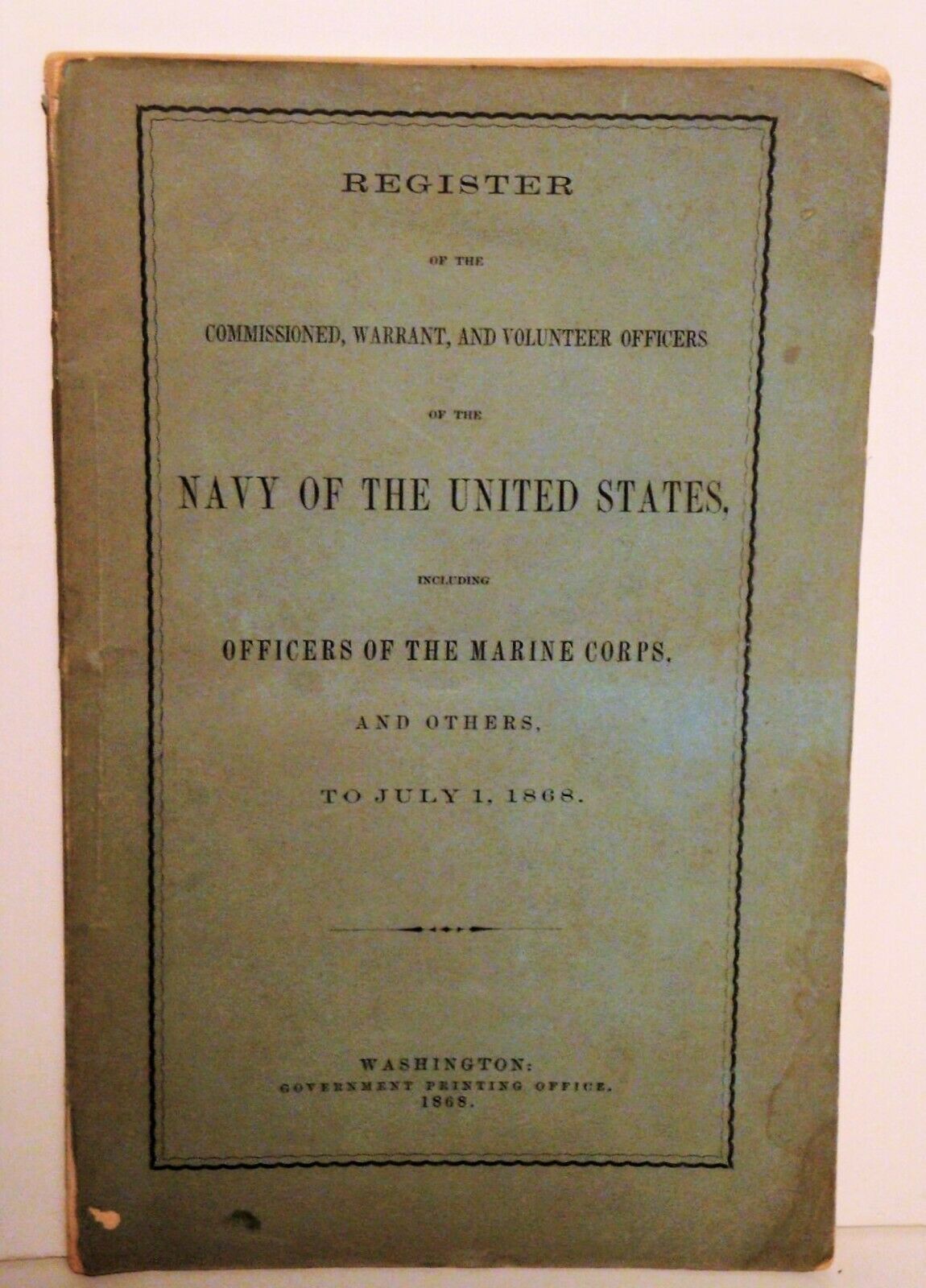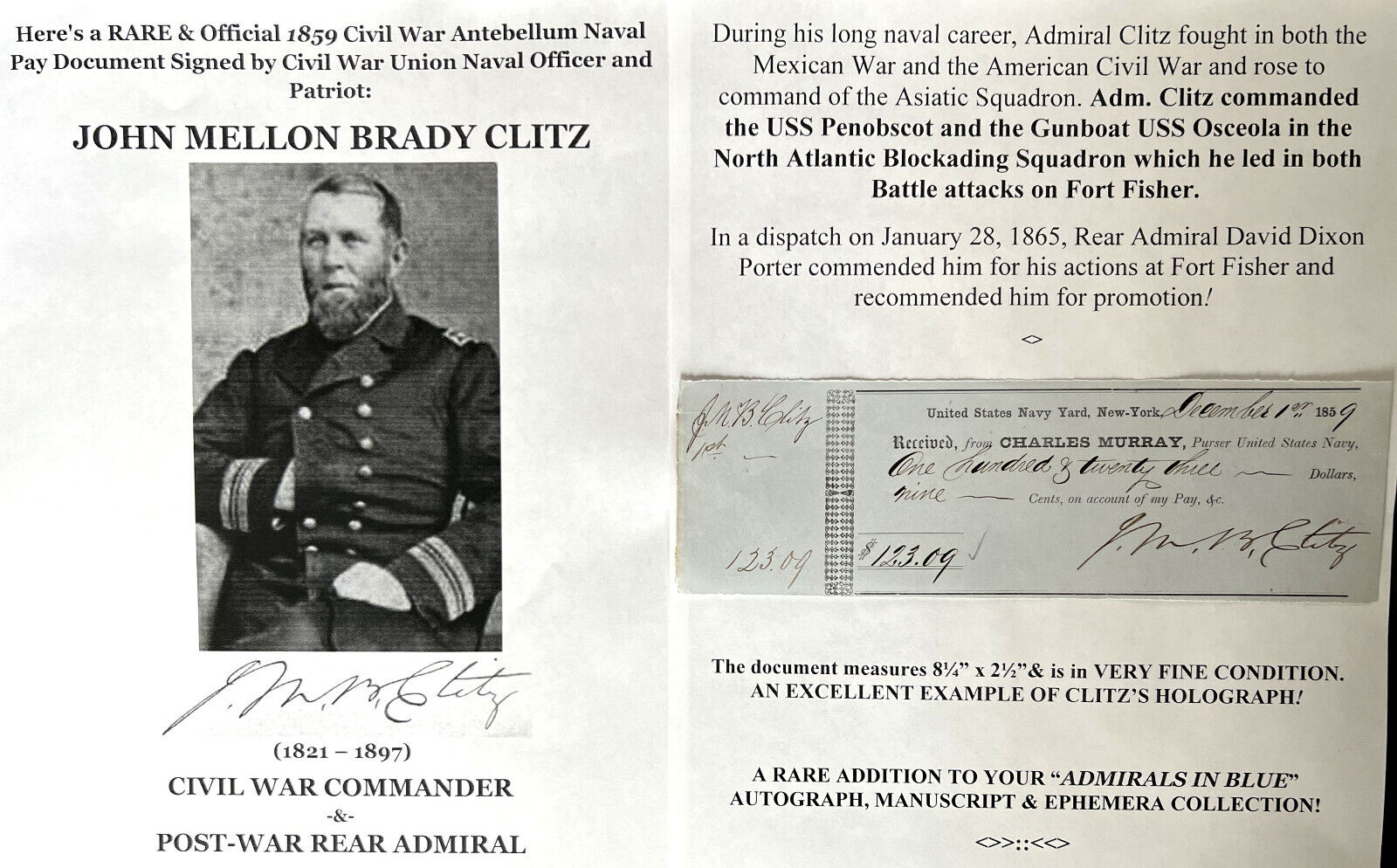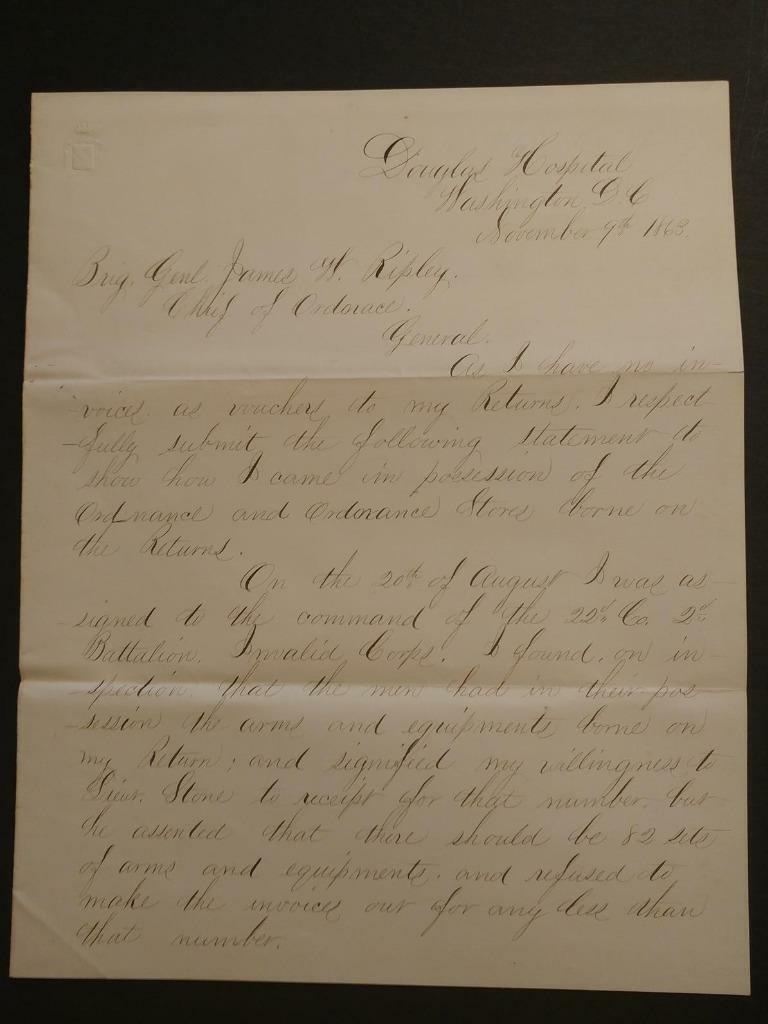-40%
CIVIL WAR GENERAL COLONEL 13th WI INFANTRY CHIEF JUSTICE LYON DOCUMENT SIGNED VF
$ 52.79
- Description
- Size Guide
Description
HERE’S A RARE CIVIL WAR DATE DISCHARGE DOCUMENT SIGNED BYWILLIAM PENN LYON
(1822 - 1913)
CIVIL WAR UNION BVT BRIGADIER GENERAL FOR GALLANT and MERITORIOUS SERVICES DURING THE WAR,
CIVIL WAR COLONEL and COMMANDER OF THE 13
th
WISCONSIN INFANTRY 1862-1865,
CW CAPTAIN, 8
th
WI INFANTRY “
EAGLE REGIMENT”
1861-2,
7
th
CHIEF JUSTICE OF THE WISCONSIN SUPREME COURT
12
th
SPEAKER OF THE WISCONSIN STATE ASSEMBLY
&
PROMINENT LAWYER and JUDGE
<
<>
>
HERE'S AN US ARMY EAGLE DISCHARGE DOCUMENT SIGNED BY LYON AS COLONEL COMMANDING THE REGIMENT, 1p., DATED AT NASHVILLE, TENNESSEE, JAN. 14, 1864, DISCHARGING FRANKLIN FOOTE, PRIVATE OF CAPTAIN NEWTON H. KINGMANS COMPANY “I”, 13
th
REGIMENT OF WISCONSIN INFANTRY, FOR RE-ENLISTMENT IN THE VETERAN VOLUNTEERS.
THE DOCUMENT IS ALSO SIGNED BY J. B. HAYES, LT. 19
th
US INFANTRY; THE ARMY PAYMASTER AND, ON THE VERSO, THE REGISTER OF DEEDS
FOR JEFFERSON COUNTY, WISCONSIN, “C. T. FARGO.”
THE DOCUMENT MEASURES 8½” x 10½” AND IS IN VF CONDITION!
A RARE ADDITION TO YOUR CIVIL WAR
“
GENERALS IN BLUE
”
AUTOGRAPH, MANUSCRIPT & EPHEMERA COLLECTION!
<<>
::
<>>
BIOGRAPHY OF GEN. WILLIAM P. LYON
William P. Lyon later in life as Chief Justice of the Wisconsin Supreme Court.
William Penn Lyon
(October 28, 1822 – April 4, 1913) was an American lawyer, politician, and judge who served as the 7th Chief Justice of the
Wisconsin Supreme Court
and the 12th Speaker of the
Wisconsin State Assembly
. He also served as a
Union Army
officer
in the
American Civil War
.
Early life and education
Born in
Chatham, New York
, Penn and his family moved, in 1841, to
Walworth County
, in the
Wisconsin Territory
, and settled on a farm near the present site of the town of
Lyons
. In 1844 he began studying law at the law offices of
George Gale
. In 1845, he continued his studies under
Charles Minton Baker
of
Lake Geneva
. And, in 1846, he was admitted to the
State Bar of Wisconsin
. He began practicing law near his family home and was appointed a
Justice of the peace
. He moved in 1850 to
Burlington
and formed a law partnership in
Racine County
.
Political career
In April 1855, Lyon was elected
District Attorney
for
Racine County
, and he moved to the city of
Racine
that same year and took office January 1856. He was re-elected in 1856. In November 1858, Lyon was elected on the
Republican
ticket to represent Racine in the
Wisconsin State Assembly
for
1859
.
Lyon was elected Speaker of the Assembly by the Republican majority on the first day of the session, January 12, 1859. He would go on to be re-elected to the Assembly for
1860
, and was again elected Speaker for that session. He did not run for re-election in 1860.
Civil War Service
At the outbreak of the
American Civil War
, Lyon formed a company of
volunteers
in Racine County and was elected their
Captain
. Lyon's company became a component of the
8th Wisconsin Volunteer Infantry Regiment
and mustered into service September 17, 1861.
The 8th Wisconsin was ordered to Missouri, in the
Western Theater
of the war, and attached to General
Ulysses S. Grant
's
Army of the Tennessee
. They participated in skirmishes along the Mississippi River to secure passage for Union forces south into Mississippi and Louisiana.
In August 1862, by order of
Governor
Edward Salomon
, Lyon was made
Colonel
of the
13th Wisconsin Volunteer Infantry Regiment
. The 13th Wisconsin saw very little combat, and was primarily tasked with securing trains and other logistics supplying frontline forces in the western theater.
At the end of the war, Colonel Lyon was given an honorary
brevet
to
Brigadier General
.
Judicial career
In early 1865, while still serving with the 13th Wisconsin, Colonel Lyon was informed that he had been nominated for election to the
Wisconsin Circuit Court
. He won the election in April 1865 and began his service as Judge for the 1st Circuit in January 1866.
In 1870, Judge Lyon was the Republican nominee for
Wisconsin's 1st congressional district
, but was defeated by Democrat
Alexander Mitchell
.
Wisconsin Supreme Court
In January 1871, Wisconsin Supreme Court Justice
Byron Paine
died unexpectedly. Governor
Lucius Fairchild
appointed Judge Lyon to fill the vacancy, and, the following April, his appointment was confirmed in a special election. Justice Lyon was re-elected in 1877 and 1883. After the retirement of Chief Justice
Orasmus Cole
at the end of his 6th term, in 1892, Justice Lyon, as the next most senior Justice, became the Chief Justice of the Wisconsin Supreme Court. Justice Lyon had already announced his intention to retire at the end of his term, however, so only served two years as Chief Justice.
Granger case
Following the 1873 elections, the state enacted the so-called "
Potter Law
"—named for Wisconsin state senator
Robert L. D. Potter
—officially,
1874 Wisconsin Act 273
. The new law was a major priority of the Granger movement and effectively put railroad and freight prices under the control of a new
state Railroad Commission
. The railroads immediately challenged the law. In the 1874 case of
Attorney General v.
Chicago & Northwestern Railroad Company
, Justice Lyon wrote with the majority that sustained the legislature's power over corporations operating within the state. For the Grangers, however, the victory was short-lived. In the 1875 election, they were defeated and the 1876 legislature stripped the Railroad Commission of much of its regulatory power.
Edgerton Bible Case
It had been a common practice in
Edgerton, Wisconsin
, for teachers in the
public school
to read passages from the
King James Bible
. In 1886,
Roman Catholic
parents complained to the school board about this practice, which they saw as teaching a sectarian and inaccurate version of the bible. The school board did not act on their complaint, so, in 1888, the parents sued in the Wisconsin Circuit Court. Judge John R. Bennett of the 12th Circuit ruled against the Catholic parents, so they appealed to the Supreme Court.
In the 1890 case of
State ex rel. Weiss and others vs. District Board, etc.
, later referred to as the "Edgerton Bible Case", Justice Lyon wrote the unanimous opinion of the court that overturned the 12th Circuit opinion and ruled that the Edgerton public school practice was sectarian instruction and, therefore, violated Article X, Section 3 of the
Wisconsin Constitution
, which explicitly prohibits sectarian instruction in state public schools.
This was a significant case on the
Separation of church and state in the United States
, and, a century later, was cited in the opinion of Justice
William J. Brennan, Jr.
, in the landmark 1963
United States Supreme Court
decision in
Abington School District v. Schempp
, which banned government-sponsored compulsory prayer from public schools.
Vosburg v. Putney
In 1889, 14-year-old Andrew Vosburg was kicked in the shin by 11-year-old George Putney. Putney was unaware that Vosburg had a previous knee injury, and the kick exacerbated the issue, resulting in severe infection. Vosburg became ill with vomiting and swelling of his leg with pus. He required two surgeries to drain the pus and remove degenerated bone tissue, leaving him with life-long weakness in his leg.
Vosburg and his family filed suit against Putney, alleging assault and battery. The 13th Circuit Court found in favor of the plaintiff and awarded 00 in damages. This decision was overturned by a ruling of the Wisconsin Supreme Court due to errors by the lower court Judge,
A. Scott Sloan
. The case was re-tried at the Circuit Court, and again found in favor of the plaintiff, this time awarded damages of 00 (approximately ,000 adjusted for inflation to 2019).
The defendant again appealed to the Wisconsin Supreme Court. Justice Lyon wrote the opinion, which became a significant precedent for
torts
cases in the United States. The key findings were that:
1.
Since the intended act was considered unlawful, the intention must also be considered unlawful.
2.
Material omissions of fact in questions to an expert witness render the witness answer inadmissable.
3.
The wrong-doer is liable for all damages resulting directly from the wrongful act, even if those damages could not be foreseen by the wrong-doer. Sometimes referred to as the
Eggshell skull
rule.
Because of the second finding, a new trial was again ordered. The third trial resulted in another appeal, and a fourth trial was eventually ordered. In all four trials, the jury found in favor of Vosburg.
Later years
After his retirement from the Supreme Court, Justice Lyon was appointed to the State Board of Control of State Charitable, Penal, and Reformatory Institutions. He became President of that board in 1898, and served in that capacity until 1903, when he resigned to move to California, where his daughter resided.
He died in California, in 1913, and was buried at
Oak Hill Memorial Park
, in
San Jose
.
<
<>
>
Thirteenth Infantry
WISCONSIN
(3-Years)
Thirteenth Infantry.-Cols., Maurice Maloney,
William P. Lyon
,
Augustus H. Kummel, Lieut.-Cols., James F. Chapman, Thomas 0.
Bigney, Augustus H. Kummel, Charles S. Noyes; Majs., Thomas 0.
Bigney, Charles S. Noyes, Samuel C. Cobb
This regiment was organized at Camp Treadway, Janesville, and
was mustered in Oct. 17, 1861.
It left the state Jan. 18,
1862, for Leavenworth and moved from there to Fort Smith, Ark.
to join the Southwestern expedition.
Upon reaching Fort Scott it was ordered to Lawrence to join
the New Mexico expedition, but this was abandoned and it was
ordered back to Leavenworth.
It was sent to Columbus, Ky.,
where it was placed on railroad guard duty, and later
garrisoned Forts Henry and Donelson.
It accompanied an expedition against Clarksville Tenn., where
it routed the Confederates and captured a quantity of army
stores.
It was then employed in scouting and was engaged in a
skirmish near Garretsburg, defeating the enemy.
It drove Gen.
Forrest's forces through western Tennessee, then marched to
Stevenson, Ala., where it captured a supply depot and held it
until reenforced.
It assisted in the successful defense of Huntsville against
Forrest and of Decatur against Hood.
A detachment of the
regiment dispersed the 4th Ala. cavalry at New Market.
The
regiment fought Hood in his attack on Nashville.
Lieut. Wagoner and 35 men of Co. G were captured at Paint Rock
River by a force of 400.
After the fall of Richmond the
regiment was ordered to Indianola, Tex., and afterwards to San
Antonio, a march of 145 miles with the thermometer at 100
degrees and many broke down.
Through all the seemingly aimless wanderings and hard marches,
with few heavy engagements to compensate, the conduct of the
men was admirable and Adjt.-Gen. Gaylord says: "The tireless
vigilance which relaxes not, day by day, and week after week.
although lacking the excitement which accompanies the movement
of armies, cannot fail to command our admiration and respect
for the 13th Wis. volunteer infantry."
It was mustered out Nov. 24, 1865.
Its original strength was
970.
Gain by recruits, 414; substitutes, 83; draft, 72;
veteran reenlistments, 392; total, 1,931.
Losses by death,
183; missing, 3; desertion, 71; transfer, 6, discharge, 321;
mustered out, 797.
Source: The Union Army, vol. 4, p.52
<<>>
Eighth Infantry WISCONSIN
(3-YEARS)
Eighth Infantry. -- Cols., Robert C. Murphy, George W. Robbins
John W. Jefferson, William B. Britton; Lieut.-Cols., George W.
Robbins John W. Jefferson, William B. Britton, James 0.
Bartlett, Duncan A. Kennedy.
This regiment, known as the "Eagle Regiment" was organized
Sept. 4, 1861, with a numerical strength of 973.
It was
mustered in Sept. 13 and left the state Oct. 12 for the lower
Mississippi.
It took part in the actions at Greenville, Island No. 10,
Farmington, Corinth, Iuka, Henderson's Hill, Pleasant Hill,
Cloutierville, Bayou Lamourie Atchafalaya River, Lake Chicot,
Jackson, Haynes' Bluff, Vicksburg Richmond, La., and
Nashville.
The general commanding at Farmington, in general orders, said,
"The Badger State may feel proud to have the honor of being
represented by so gallant a regiment as the 8th Wisconsin."
Gen. Sherman highly complimented the regiment for doing "its
whole duty in the camp, on the march and in battle," for
"Pecular courage and gallantry at Jackson and throughout the
siege of Vicksburg," and for other services.
The original strength of 973 was augmented to a total
enrollment of 1,643.
Losses by death 255, missing 3,
desertion 60, transfer 41, discharge 320.
It was mustered out
at Demopolis, Ala., Sept. 5, 1865, with 964 men.
Source:
The Union Army, vol. 4
I am a proud member of the Universal Autograph Collectors Club (UACC), The Ephemera Society of America, the Manuscript Society & the American Political Items Collectors (APIC) (member name: John Lissandrello). I subscribe to each organizations' code of ethics and authenticity is guaranteed. ~Providing quality service & historical memorabilia online for over ten years.~
WE ONLY SELL GENUINE ITEMS, i.e., NO REPRODUCTIONS, FAKES OR COPIES!














